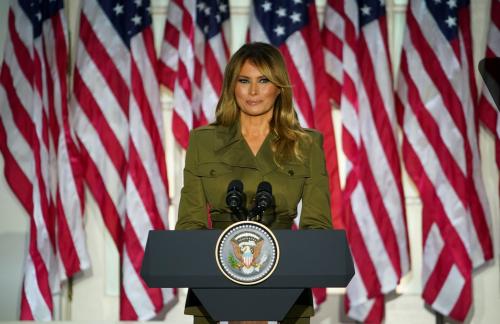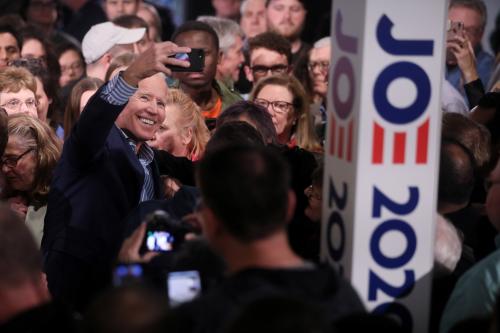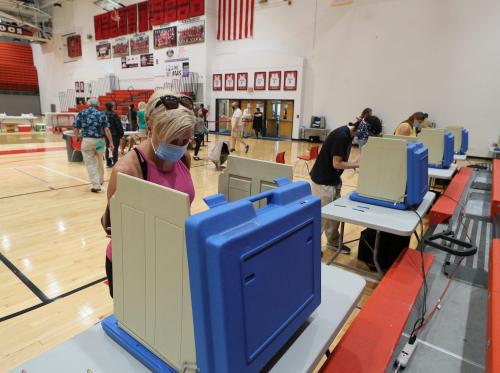On Monday night Melania Trump addressed the Republican National Convention. She was poised and elegant, and in contrast to the red meat speeches that preceded hers the speech she gave was lovely and calming.
Of course reaction to the speech was quickly clouded by the fact that there were striking similarities between her speech and portions of Michelle Obama’s 2008 speech. But why should anyone be surprised at an instance of plagiarism in a single speech? By Trump’s campaign manager’s own admission, they are plagiarizing the entire campaign from Richard Nixon’s 1968 law and order campaign. But back to the speech.
Modern political campaigns have developed a “spouse” tradition. Until this year, that has always meant the wife not the husband. And the wife’s job has been to humanize the husband. In the 1992 campaign Hillary Clinton came under criticism for the lengthy policy speeches she gave in the course of introducing her husband. “Two for the price of one,” went over like a lead balloon and both Bill and Hillary stopped talking about it. By the time of the 1992 convention Hillary Clinton had adopted a more traditional role. Most other candidates for first lady have honed their campaign style in a way that rounds out and “softens” their husband.
And this is where Melania’s speech fell short. She needed to tell American women that her husband is not the bully that he appears to be, that he can be warm and loving and kind. But her speech only reiterated Trump’s own narrative about himself. He never gives up—“He knows how to win.” There were no anecdotes about their family life, no funny stories about kids or pets. Melania’s speech was just a calmer version of the Donald’s rap on himself.
The section of Michelle Obama’s speech that Melania should have taken a cue from was the section where she talked about Barack, the new dad, driving her and their first daughter home from the hospital “at a snail’s pace” and cautiously looking in the rear view mirror at them the whole way, feeling the “whole weight of her future in his hands.” This passage not only showed the more human side of then-Senator Obama, but related the Obama’s experience to that of the millions of Americans who could harken back to their nerve-racked time as new parents.
No one needs humanizing as much as Donald Trump. He heads into the November elections with perhaps the biggest “woman” problem ever confronting a presidential candidate.The “gender gap” is the difference between the male and female vote and it is particularly important in presidential politics. The 2012 election ended with the largest gender gap in history. Mitt Romney won among men by 8 points, 54% to 46%, but lost among women by twelve points, 56% to 44% yielding a whopping 20-point gender gap.
So far, Trump is facing the prospect of an even bigger gender gap. In a Pew poll from early July, Clinton was beating Trump by 24 percentage points among women and Trump was beating Clinton among 6 points among men—yielding a 30 point gender gap. In a Monmouth University poll from late June Clinton’s lead among women was 27 points and Trump’s lead among men was 13 points. And in a Public Policy Polling release from late June, Clinton’s lead among women 15 points while Trump’s lead among men was 11 points.
What makes the gender gap especially important is the fact that, in recent years women have tended to vote at higher rates than men. Of course, Trump’s candidacy could spur record turnout among the white men he speaks to so powerfully, but history here is not on his side. According to Census data on turnout, the proportion of women turning out has exceeded male turnout since 1980 and the sheer number of female voters has exceeded the number of male voters since 1964. In 2012, 63.7% of women voted while only 59.8% of men voted. In other words, even if Donald Trump could erase the gender gap by getting the same proportion of men voting for him as women voting for Hillary, he would still have to face a gap in participation.
Erasing the gender gap is perhaps the biggest challenge the Trump campaign faces. Melania’s speech, plagiarized or not, was a missed opportunity.
Elaine C. Kamarck is a Senior Fellow at the Brookings Institution and author of Primary Politics: Everything You Need to Know about How America Nominates Its Presidential Candidates. She is a superdelegate to the Democratic convention.
The Brookings Institution is committed to quality, independence, and impact.
We are supported by a diverse array of funders. In line with our values and policies, each Brookings publication represents the sole views of its author(s).







Commentary
Melania Trump fails to help close the gender gap
July 19, 2016